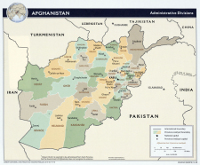Afghan and Coalition forces have dealt another blow to the Taliban’s top leadership network in Logar, capturing the group’s military commander for the province during a recent raid.
A combined security force captured Zia Ul Haq, who was described as “a senior Taliban commander operating in Logar province and responsible for the facilitation of foreign fighters and suicide bombers into Kabul City,” according to an International Security Assistance Force press release. ISAF often uses the term “foreign fighters” to describe al Qaeda operatives.
Haq was detained along with a Taliban sub-commander “responsible for planning and coordinating attacks” and a fighter during a raid in Pul-e ‘Alam on Aug. 26.
Haq served as the overall military commander for Logar province, a US intelligence official who tracks the Taliban told The Long War Journal. He also is closely linked to the Kabul Attack Network, the group responsible for carrying out attacks in and around the Afghan capital.
ISAF has stepped up pressure on the Taliban in Logar since June. On Aug. 19, Afghan and Coalition forces killed Qari Muir, a senior Taliban commander who had previously served as the deputy shadow governor, the military commander, and the intelligence chief for the Taliban in Logar province. Haq replaced Ghulam Sakhi, the former military commander for Logar, who was killed during a raid on June 25.
The Taliban’s leadership in Logar has been “decimated,” a senior US intelligence official told The Long War Journal.
Haq’s capture should yield valuable intelligence on the Taliban’s network in Logar as well as the Kabul Attack Network. The Kabul Attack Network is led by Dawood (or Daud) and Taj Mir Jawad, military and intelligence officials told The Long War Journal. Dawood is the Taliban’s shadow governor for Kabul, while Taj Mir Jawad is a top commander in the Haqqani Network. In the US military files recently released by Wikileaks, Taj Mir Jawad is identified as a top Haqqani Network leader.
Logar province is a known haven for al Qaeda and allied terror groups, including the Haqqani Network. The presence of al Qaeda cells has been detected in the district of Pul-e ‘Alam; or one of Logar’s five districts, according to an investigation by The Long War Journal. In May 2009, Afghan and Coalition forces targeted a Haqqani Network cell in Pul-e ‘Alam that facilitated suicide bombers.
Over the past several years, the Taliban and the Haqqani Network have taken control of areas in Logar and neighboring Wardak province, and have used these safe havens to launch attacks into Kabul.
Sources:
• Taliban commanders captured in Logar, ISAF press release
• Senior Taliban commander killed in eastern Afghanistan, The Long War Journal
• IJC Operational Update, June 26, ISAF press release
• Afghan, coalition forces kill four militants, detain five in Logar; detain five in Khost, ISAF press release









4 Comments
I STILL would like to know what really happens to these “detained” insurgents after capture.
Death, life, bribed escape? Given justice there, I hope executed after all necessary information is pried out, or otherwise given up.
After a while, he will escape either through bribes or by brotherly love of his guardians. It happened again and again and again, including former Gitmo detainees sent abroad.
Rookie, do you have any evidence of this happening in Afghanistan? It has obviously happened in Saudi Arabia/Yemen/Egypt etc.
I would think the Afghans are a bit more careful
No, he will repent and see the evil of his ways.
After his vow to not fight again he will be released where he will rejoin Al Qaeda and fight again.
Many more will die at his hands.